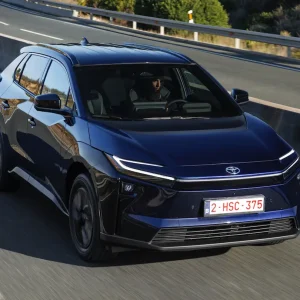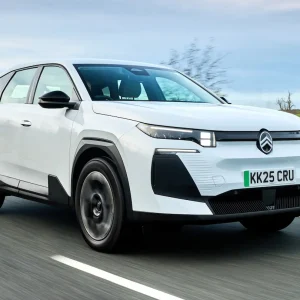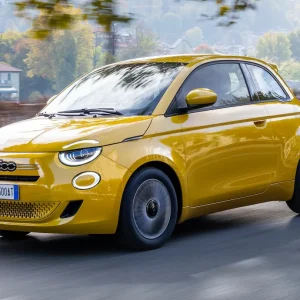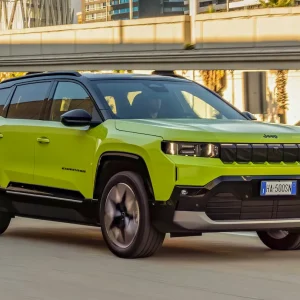You might have seen advertisements for the new Vauxhall Corsa since December 2019. I seem to remember the TV ad showed an oil tycoon mourning the passing of petrol in a graveyard full of decaying refuelling pumps.
Ironically, this campaign began when only petrol and diesel versions of the new Corsa were available. The Corsa-E is now on sale and, of course, an electric Corsa is a big deal.
Vauxhall is hoping 10% of Corsa sales will be of the electric version, and, of course, it needs to be such a large proportion to help the brand meet EU average CO2 targets and avoid fines.
When we featured the new Corsa in January we explained that, under PSA’s recent takeover of Vauxhall and Opel, the new Corsa has been developed alongside the Peugeot 208, sharing many of its components and powertrains.
The electric version is no exception, and, like the 208 it comes with a 136hp electric motor, with Vauxhall customers offered a choice of two equipment grades and two different-capacity on-board chargers – 7.4kW and 11kW – with the faster charger costing a £750 premium.
It means the range starts at just over £30,000 for the SE Nav, before the £3,000 plug-in car grant is applied, although P11D value will only factor into company car tax calculations from April 2021 as this year is currently zero for electric cars.
There are currently two obvious rivals the same size as a Corsa-E: the Peugeot E-208, with which it shares much of its technology, and the Renault Zoe, designed from the ground up as an electric car.
It is also possible to buy an MG ZS Electric for less cash if the amount of metal for the money is more important, while Kia has recently introduced a lower-power 136hp version of the E-Niro in the UK with a mid-grade equipment level.
They might not have all of the kit our Elite Corsa-E test car has, but some drivers will have different priorities.
It’s a smart-looking vehicle, and takes on a sophisticated appearance its predecessor lacked. At just over 4m long it’s at the larger end of the small car spectrum and inside it roomy enough for four adults.
Sharing components with the Peugeot 208 shouldn’t be an issue, and it probably would look a bit more coherent inside if the French brand wasn’t committed to its own, distinct interior design philosophy.
The Peugeot’s I-Cockpit has a broad digital instrument display visible above the top of the flatter steering wheel. The Corsa’s display is also digital, but a different size, and viewed through the steering wheel. The rectangular digital display sitting in a binnacle designed for dials is clearly a design compromise, although there are a couple of warning lights (service indicator and engine warning) in the framing to the left. Not a disaster, but the whole thing feels like an afterthought.
Otherwise, the Corsa-E interior is well finished, if a little dark, with padded elbow support on the driver and front passenger door.
The driving experience is not dissimilar to other small cars with engines. The gear selector is borrowed from Peugeot’s auto models, but there’s no sport mode here – it’s separate from the gear selector and activated by a switch on the centre console – and you can select ‘B’ for maximum energy recuperation instead.
As a car designed to excel around town, the Corsa-E works well. It’s easy to drive and manoeuvre with light controls and decent visibility, although we would prefer the windscreen pillars to be a little narrower.
There are three drive modes, with the default being normal. Eco mode should help preserve charge in the battery, while Sport takes full advantage of the acceleration available with the electric motor.
The remaining range available is prone to significant fluctuations unless running in Eco mode, too, which could make the occasional longer journey less predictable in terms of when topping up would be needed.
Away from town, the Corsa-E is comfortable as long as the road surface is smooth. Find your way on to poorly maintained or rippled road surfaces, and suddenly the car feels skittish, unless speed is kept to a minimum.
It could be that an SE Nav version, fitted with 16in alloys compared with the 17in wheels on our Elite test car, could be a little calmer, but it really does discourage you from going anywhere near the speed limits on faster roads if the surface is less than perfect.
In our costs comparison the Corsa is forecast to have slightly higher depreciation than the Peugeot E-208 (perhaps a reflection of its volume, and maybe a higher level of discount available), which already puts the Vauxhall in a tougher position to recommend it.
However, its depreciation is comparable to a Zoe, as is its RV forecast. But factor in the Zoe’s longer available range (245 miles versus 217) and it’s still difficult to vouch for the Vauxhall.
Vauxhall Corsa-E Elite 7.4kW
P11D: £33,255
Residual value: 35%
Depreciation: £21,605
Fuel: £3,324
Service, maintenance and repair: £1,482
Cost per mile: 44.0p
Range: 217 miles
CO2 (BIK band): 0g/km (0%)
BIK 20/40% a month: £0/£0
Boot space: 309 litres
Engine size/power: 136hp electric motor





